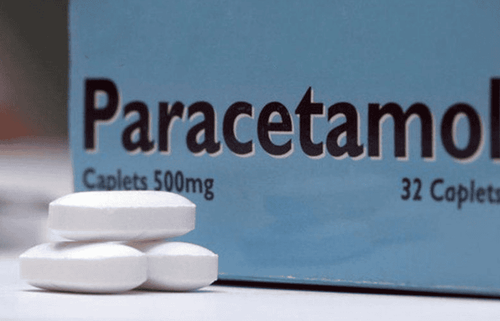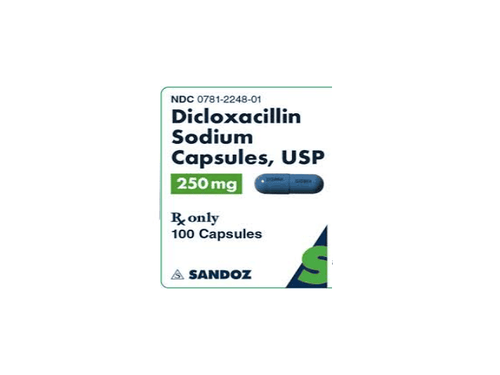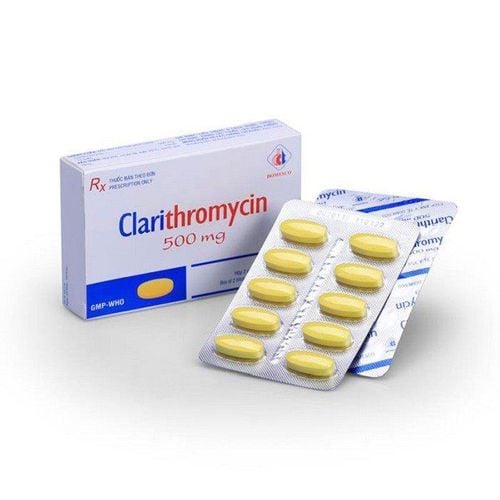This is an automatically translated article.
Children with fever of unknown cause, depending on the degree of fever, the nature of the fever and accompanying symptoms to diagnose the disease. When a child has a fever of unknown cause, it is important that the family take good care steps including monitoring body temperature, using fever-reducing measures and providing adequate nutrition, and taking the child to the doctor. early to definitively treat the fever.
1. Common mistakes when taking care of children with fever
Taking care of children, especially when sick, is not easy for parents. Improper care can cause the child to not have a fever, and even increase the fever, which is dangerous. Therefore, parents need to avoid a number of things after taking care of a child with a fever, especially for a child with a fever, no cough, no runny nose:
Giving children fever-reducing medicine too soon: Parents should not give their children medicine. reduce fever when the body temperature is still below 38.5 degrees Celsius. Instead, when the fever is low, just rehydrate, electrolytes, warm compresses and dress the child in cool clothes. Abuse of epilepsy drugs: Antiepileptic drugs do not work to reduce convulsions in children with frequent seizures, nor do they work to prevent high fever in children. Therefore, doctors recommend that parents do not give their children anti-epileptic drugs when they have a fever without a prescription. Give your child a variety of antipyretics : There are two commonly used fever reducers , paracetamol and ibuprofen . The dose and interval between doses are different, which is easy to cause confusion leading to side effects for children. In addition, ibuprofen is contraindicated for children with dengue fever because it makes the condition worse, so if you are not sure what the cause of the fever is, it is best to take paracetamol to reduce the fever. Cold compress, fever-reducing patch: If the child has a fever due to infection or pneumonia, the cold compress can make the condition worse. In addition, applying oil or using a patch has little effect on reducing fever, but also harms the baby's skin. Instead, warm compresses are an effective and safer alternative to lower a child's fever. Arbitrarily dividing the dose of rectal medicine: The dose of anal antipyretic is fixed, do not arbitrarily break the pill or insert many pills at the same time.
2. Causes of fever in children
2.1. Acute fever Fever lasting ≤ 14 days is called acute fever, most of which occur due to viral respiratory or gastrointestinal infections such as otitis media, pneumonia, bronchitis. Acute fever and common causes of fever by age in young children are described as follows:

Sốt cấp tính và nguyên nhân gây sốt phổ biến theo tuổi ở trẻ nhỏ
2.2. Recurrent/periodic acute fever The phenomenon of alternating episodes of fever is called recurrent/periodic acute fever. Some causes of recurrent/recurring fever include:
Viral infections that cause illness and recurrence in young children Leukemia, mouth ulcers, pharyngitis PFAPA syndrome Familial Mediterranean fever (FMF) Cyclical syndrome TNF receptor-associated (TRAPS) Hyperimmunoglobulin D syndrome (HIDS) 2.3. Chronic fever Fever that lasts more than 14 days is called chronic fever. Causes of chronic fever are divided into two categories: infectious and non-infectious. In particular, infectious causes include: Sinusitis, pneumonia, abscesses, intestinal infections, HIV, tuberculosis, parasitic infections, Lyme disease, endocarditis, bone and joint infections.
In addition, some non-communicable diseases can also cause prolonged fever including colitis, lupus, acute rheumatic fever, cancer, drugs, dysregulation of body temperature, etc.

Trẻ sốt không rõ nguyên nhân trên 14 ngày được gọi là sốt mãn tính
3. How to take care of children with unexplained fever at home
Children with unexplained fever should be properly reduced, carefully monitored and taken to the doctor immediately to find out the exact cause of the illness. Some measures parents need to apply when a child has a fever include:
Replenish water for children: Children easily lose a lot of water due to fever, so parents need to replenish water in many different ways such as drinking water, water. fruit juice, breast milk. This not only helps to rehydrate, but also helps to increase the child's resistance. Let the child wear cool clothes: Parents should take off the child's clothes, avoid covering the blanket to help reduce the fever more effectively. Give children fever-reducing drugs: Antipyretic drugs are only used for children with fever from 38.5 degrees Celsius or higher, should use paracetamol at a dose of 10-15mg/kg/time, once every 4-6 hours if still needed. still high fever. Ibuprofen should not be used when it is not clear whether the child has dengue fever or not, because giving ibuprofen to a child when he has dengue fever can cause thrombocytopenia, gastrointestinal bleeding difficult to stop bleeding, life-threatening to the patient. young. In case the child cannot take medicine due to vomiting a lot, use antipyretic drug in the form of anal tablet. Warm compresses for children: Places to apply include the neck, armpits, groin and wipe the whole body. Mix warm water at a moderate temperature, dip a towel in it, wring it out, and then wipe it over the above locations. Change the towel dipped in warm water continuously until the child's body temperature drops, warm compresses can help reduce fever by dilating blood vessels. Give the child a warm bath: Mix moderately warm water, then put the child in a basin of water, wipe the whole body for 5 minutes, then take the child out to dry and wear cool clothes. When a child has an unexplained fever, it is important for families to take good care. If the child's fever does not improve, parents need to take the child to a medical center for examination and treatment.
With many years of experience in examining and treating diseases in children, now the Pediatrics Department at Vinmec International General Hospital has become one of the major health care centers, capable of examining , screening and treatment of many specialized diseases in children. Therefore, if the child has signs of unexplained fever, parents can take the child to Vinmec International General Hospital for examination and receive support and advice from doctors and nutritionists. .
Please dial HOTLINE for more information or register for an appointment HERE. Download MyVinmec app to make appointments faster and to manage your bookings easily.













